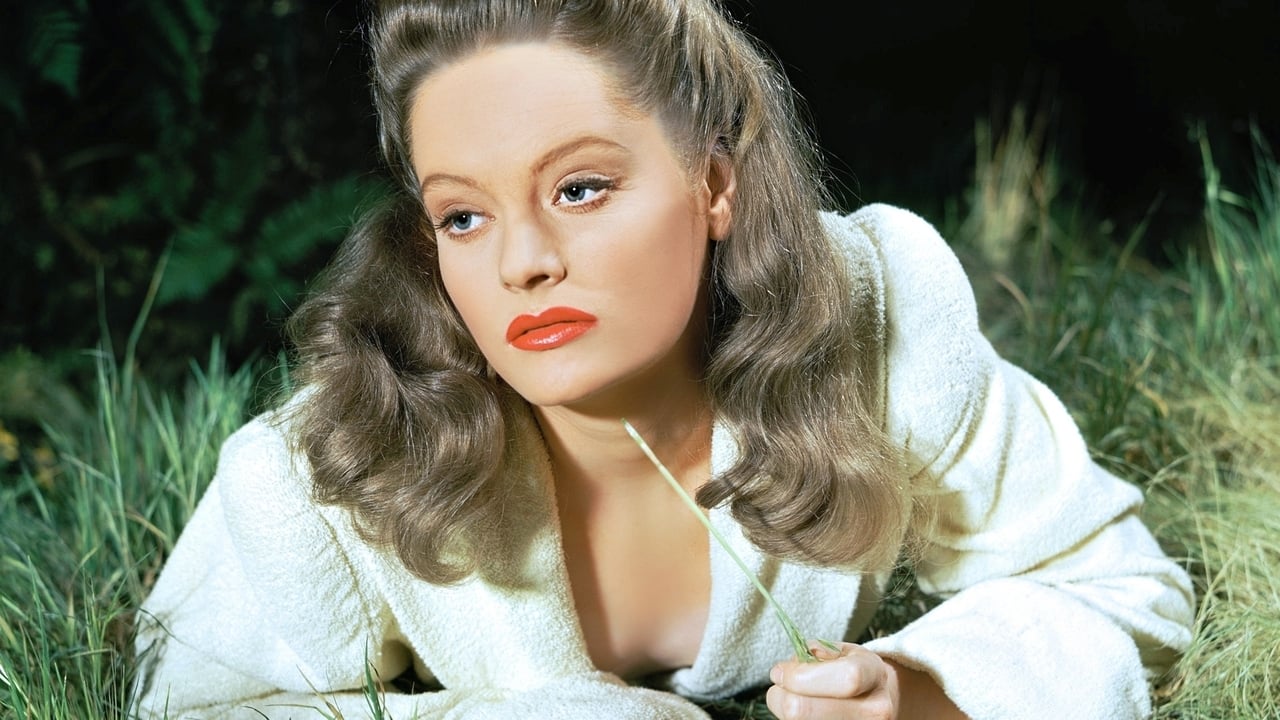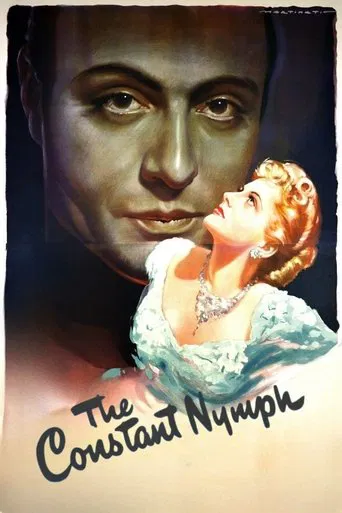

'The Constant Nymph' tells the story of a delightful young girl (Joan Fontaine) who has a crush on an older man (Charles Boyer), a friend of her father's. Fontaine is fantastic, grabbing us from the start with infectious energy, and truly channeling what it is to be a teenager, despite being 26 years old at the time. Boyer turns in a strong performance as well, playing a headstrong composer of modern symphonies, which are short on melody and jarring. He marries a rich woman (Alexis Smith), and the two soon butt heads over social functions, as well as her jealousy over the special relationship he has with the young girl.Despite this relationship and all of the dreamy glances Fontaine casts in Boyer's direction, those who liken the film to Lolita are off-base. There is such purity and chasteness here, with Fontaine's character having a sense of honor against doing wrong, and Boyer's having no lascivious interest in her or her sisters at all. They are the polar opposites of Dolores Haze and Humbert Humbert, who between flirtation, predation, statutory rape, and ultimately, humiliation, have us cringing (though perhaps unable to look away). The title word here, 'nymph', should be considered simply as a young maiden, without the sexual connotations it's sometimes associated with. I really liked this innocence, it makes the story tug on the heartstrings all the more, and I also liked the civility and grace by which even the strongest and most personal feelings are expressed. The plot borders on melodrama but it's the strength of the performances that carry it for me. Fontaine was well worthy of her Oscar nomination, Boyer ranges from troubled artist to affectionate 'uncle', and Alexis Smith simmers visibly as she tries to control her feelings. It wanders dangerously close to cloying, but ultimately is just the right amount of sweet, and rather touching.
... View MoreThe idea of Joan Fontaine at age 25 playing a teenage girl certainly inspired my curiosity about this film. Her performance, which was one of her favorites, was Oscar nominated. Tessa Sanger is a role of complexity and Fontaine gives her a naive nobility in the body of a girl who is energetic and awkward. The daughter of a musical composer, she is infatuated with Lewis Dodd (Charles Boyer), a family friend who periodically comes to visit.Lewis is a frustrated composer with little regard for social conventions. His cynical nature is somewhat abated whenever he visits the Sangers, who live far outside the city. Lewis marries into a rich family and his wife, Florence (Alexis Smith), does her best to accommodate his artistic temperament, but she begins to see Tessa as a divisive factor in their relationship.The music in the film supports the film's story about love. Tessa's love is selfless and pure, the stuff of pure romanticism. Such sentiments are not available to Lewis, and his compositions reflect his inability to access emotional depth. Musical director Erich Wolfgang Korngold supplies a score that consciously illustrates the contrast between the dissonance of modernism with the melodic lushness of romanticism. This culminates in the dramatic and satisfying final scenes.Fine acting, solid direction by Edmund Goulding, wonderful music, beautiful fashions (if only they were in color!) all make for a unique film about love that may be timeless despite the tragic consequences of time. At its core is the performance by Fontaine, who is a joy to behold.
... View MoreCharles Boyer and Joan Fontaine star in "The Constant Nymph," a 1943 Warner Brothers film directed by Edmund Goulding. The film also features Alexis Smith, Peter Lorre, Charles Coburn, and Brenda Marshall.Joan Fontaine plays Tessa, a 14-year-old who is part of the Sanger family, who is visited by a friend, composer Lewis Dodd. Dodd is very close to the entire family, and the father (Montagu Love), an old man, asks Lewis to contact his late wife's brother (Charles Coburn) should anything happen to him. He wants his daughters - Toni (Marshall), Paula, and Tessa to be taken care of. Tessa has always been in love with Dodd, but at her age, it seems like a childhood crush.Sanger dies that night, and in the next scene, we see that Charles has arrived with his gorgeous daughter Florence (Smith) and the smitten Lewis marries her immediately. Toni marries; Tessa and her younger sister ultimately go off to school but run away. The younger girl then joins Toni, but Tessa stays in the house with Lewis and Florence.Florence is jealous of Tessa's close relationship with Lewis; Tessa understands his music and knows his potential, and they have a long history. Florence's resentment of her becomes more and more obvious.This is a really wonderful film, so lovely that it's surprising it hasn't gotten more attention, though Joan Fontaine was nominated for an Oscar. She's 26 here, playing fourteen. In the beginning, she's all arms and legs, awkward, lanky, and a ball of energy. Put it this way - I dated this movie as being before Rebecca! So was she convincing? Yes. Despite her Oscar nominations, I still think Fontaine is underrated. One isn't certain how much time has passed during the film, but naturally the character cleans up and wears better clothes. She then seems more mature.Boyer does a marvelous job as the composer searching for his voice through music; and Alexis Smith is great as she goes from friendly, polite with an edgy, and then just plain awful. The rest of the cast is top-notch, with Lorre as a suitor of Toni's who becomes her husband."The Constant Nymph" is a story of unrequited love, a search for self, and the self-expression an artist can have once he's allowed himself to feel.Don't miss this when it comes around again on TCM as it doesn't look like it's on DVD. Thank goodness for TCM bringing us these forgotten gems once in a while.
... View MoreFilm preservation is all about saving what survives for today and future generations. Among the lost are London AFTER MIDNIGHT and CONVENTION CITY. 80% of all silent films are lost and 50% of all films made before WWII are gone. Some films are forgotten like original versions when remakes are made. The 1935 version of MAGNIFICENT OBSESSEION launched the career of Robert Taylor but it is rarely shown after it was remade in 1956. Other films can be repressed by the artist who made them, Stanley Kubrick bought up and tried to destroy all the copies of his first film, FEAR AND DESIRE. THE CONSTANT NYMPH (1943) is mostly forgotten because the author's will stated after the original release film it could only be shown at universities or museums. Nymph, definition. A nymph in Greek mythology is a minor nature goddess typically associated with a remote location. Nymphs personify the creative and fostering activities of nature and identify with the life- giving outflow of springs. Nymphs tended to frequent areas distant from humans, but could be encountered by lone travelers outside the village, where their music might be heard, and the traveler could spy on their dancing or bathing. For me, the title THE CONSTANT NYMPH might mean, always innocent or always nurturing. Source & other versions. The book by Margaret Kennedy, THE CONSTANT NYMPH was a runaway bestseller when published in Britain in 1924. One review from The Atlantic magazine said, "It's a novel about ideas... as well as the sort of delicious and merciless emotions that can make people exuberant or desperate." It was also quiet controversial. In 1926, Margaret Kennedy along with Basil Dean adapted THE CONSTANT NYMPH for a three act play for the London stage starring Noel Coward and Edna Best. Playwright Basil Dean jump started his career by turning this novel into a very successful play and backing the first two movie versions first in 1928 and again in 1933. Basil Dean used his profits to form Associated Talking Pictures an important film factory that later became Ealing Studios. Cast, supporting. Among the supporting cast is Peter Lorre who wanted to prove he had more range than playing Mr. Moto or criminal types. Charles Coburn, the white haired heavy set comedy relief who was an overnight discovery at age 61 is best known for THE MORE THE MERRIER and GENTLEMENT PREFER BLONDES, but in tonight's film he has trouble pronouncing the name Roberto and instead says Robert 'Oh. And grand dame, Dame May Witty plays the old socialite that is charmed out of her silver slippers by Charles Boyer. Cast leads. Famed composer Erich Wolfgang Korngold, his first movie score was for A MIDSUMMER NIGHT'S DREAM, then CAPTAIN BLOOD and his most famous is THE ADVENTURES OF ROBIN HOOD. But classical music fans point to this films concluding piece the tone poem, TOMORROW as some of his most beautiful he ever wrote. You know what the biggest complaint about this composer was – he didn't write enough music! The third lead is played by Alexis Smith whose early Hollywood nickname was The Dynamite Girl. Alexis is better remembered for costarring with handsome leading men in costume films, here she gets to really act – and what a delicate tight rope act it is! Charles Boyer became a star in France as the lead in LILIOM which was remade in this country as the musical CAROUSEL. His better American films include GASLIGHT, but he is mostly known for his romantic films like: ALGIERS, LOVE AFFAIR and ALL THIS AND HEAVEN TOO. He often played lovers or musicians. Director Edmund Goulding specialized in luminescent, star-studded dramas for MGM like the Oscar winning GRAND HOTEL. Well Goulding got permission and the assignment to make this film but Warner bros. studio wanted him to cast Errol Flynn and Joan Leslie in the leads. But he knew he wanted Charles Boyer to play the musician, but who to play the girl, Tessa? Well as these things happen only in Hollywood, one night at Romanoff's Restaurant he spotted his old friend actor Brian Aherne who had starred in the 1933 version of THE CONSTANT NYMPH in the role as the composer. It seems Brian and his then wife who was also a licensed pilot had just flown in from their ranch. Well Goulding asked Aherne who he should cast as Tessa the young girl, she had to be a name and skinny, frail and flat chested? And Joan said, "Why not me?" To which Golding responded, "Who are You?" To which she said, "Joan Fontaine." He was stunned, thought for a minute (REBECCA, SUSPICION) then said, "Right!" and jumped up to call the studio shouting he had found his Tessa! And she wrote in her autobiography she loved the way he ran the set and carefully directed her! Joan de Beauvoir de Havilland, hard to believe she's Japanese, born Oct. 22, 1917 in Tokyo, Japan. She changed her name to that of her actress mother's stage name of Fontaine. She was cast opposite Fred Astaire in A DAMSEL IN DISTRESS and had small parts in GUNGA DIN & THE WOMEN. Then Alfred Hitchcock got her Oscar nominated in REBECCA which she was not only the lead in, but it won the Academy Award for Best Film of the Year. In Hitchcock's next film SUSPICION Joan won the Oscar for Best Actress. When I saw this picture for the first time in 35mm, just 1 month ago, I was quickly taken in by the sincerity of the performances, the beautiful lighting and cinematography – and then Joan came along and everything lit up! I love how she jumps around like an excitable girl, her body language and actions of a child. And, she did it so well, she again was Oscar nominated (the third time in four years!) but lost to Jennifer Jones for THE SONG OF BURNADETTE. Joan's next film was JANE EYRE and later LETTER FROM AN UNKNOWN WOMAN.
... View More